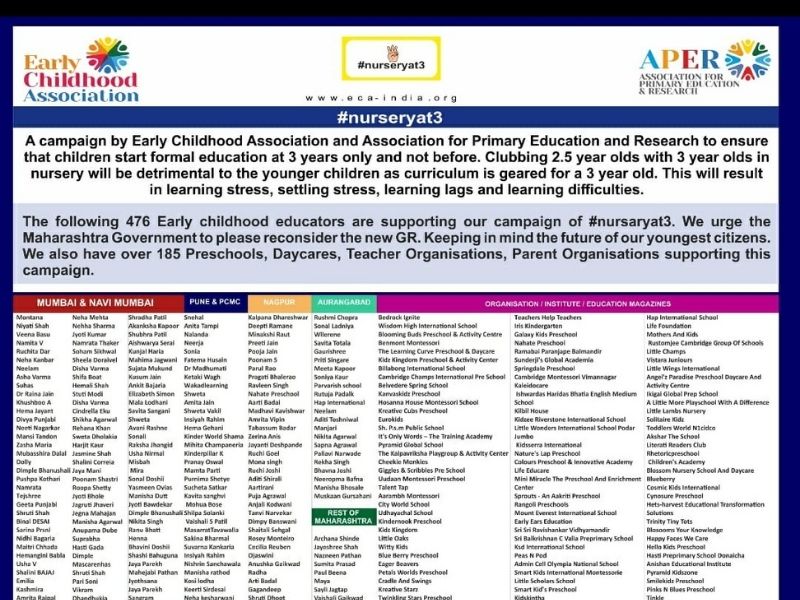– Dipta Joshi
Early childhood educators in Maharashtra have launched the ‘Nurseryat3’campaign to raise awareness about the long-term detrimental impact of allowing children as young as 2.5 years to be enrolled in pre-primary classes. On September 18, the state had issued a government resolution (GR) that relaxed the cut-off date for school admissions to pre-primary and grade one classes to December 31 from the earlier cut-off date of September 30. The new cut-off date will effectively allow children as young as 2.5 years and 5.5 years to be admitted to pre-primary and class one respectively.
Front-ended by the Early Childhood Association, a pan-India not-for-profit with a membership of 9000 preschools in Maharashtra, the ‘Nurseryat3’campaign wants the state government to encourage age-appropriate education amongst children. If implemented, the new cut-off date will mean children born between the period October 16-December 31 in the years 2014, 2015 and 2016 will be forced to skip a year of foundational learning of literacy and numeracy (See box).
“Presently we are creating the awareness momentum, and then we are going to write to the chief minister appealing to him to cancel the September 18 GR by sending data on the number of educators and parents supporting this campaign. We are also planning a Twitter storm next Sunday (November 1) with #Nurseryat3,” says Swati Popat Vats, president, Early Childhood Association.
The decision to relax the cut-off date was aimed at arriving at a common cut-off date for admissions in the state’s schools across different educational boards despite their differing academic calendars. While schools affiliated with the Central Board of Secondary Education (CBSE) and the Council for the Indian School Certificate Examination (CICSE) begin their academic session in April, schools affiliated with the state education board begin their sessions in June each year. However, with the new December 31 cut-off, children seeking admissions could be as young as 8 months (for sessions that begin in April) or 6 months young (for sessions beginning in June).
Despite the widespread criticism of the state government’s September 18 GR since its announcement, there has been no move from the government to revoke the GR. In fact, a state government issued clarification (dated October 12) further reiterates, parents have the flexibility to admit their wards aged between 3.5-4.5 years to lower kindergarten (LKG) classes. The clarification states the September 18 GR was aimed at ensuring children admitted to class one for the academic year, 2020-21 complete 6 years of age in December 2020.
Following parents’ requests to delay enforcing the GR by a year, schools that have already completed their admission process for the academic year, 2021-22 can now follow the September 18 directives from the academic year, 2022-23.
The move will bring some relief to educators who are hoping to convince the state government to relook its stand. “The new cut-off has already resulted in parents asking their children to be admitted to higher classes without realising its detrimental effects on their toddler’s language and social development skills when they skip a class,” adds Swati Popat Vats.
The ‘Nurseryat3’campaign has received widespread support from influential parenting communities and collectives like the First Mom’s Club, UNIMO, Kidskintha, magazines like EducationWorld, ParentsWorld and well-known Mumbai-based developmental pediatrician, Dr. Samir Dalwai.
Also read: Child experts ask Maharashtra government to revoke order on nursery age
